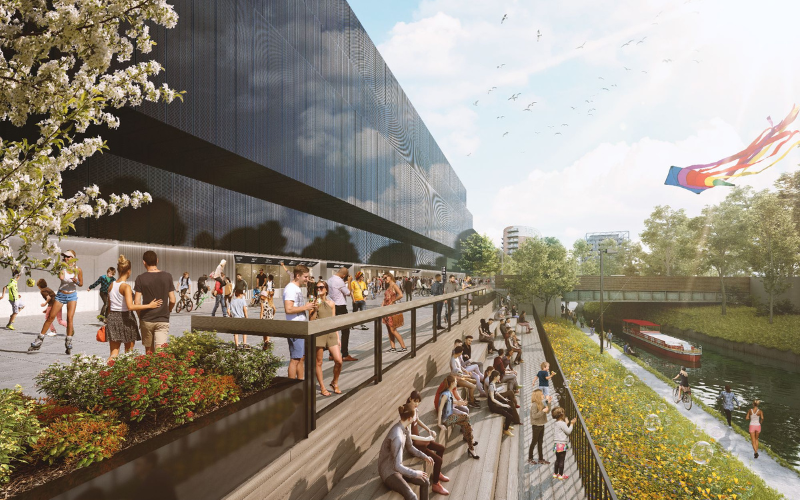These Are the Top 5 Features that Make Co-op Live Sustainable
08/08/2022 15:13
Share

These Are the Top 5 Features that Make Co-op Live Sustainable
We’ve already taken a look at what the new arena could look like in our recent blog post, but just what exactly makes the Co-op Live Arena so sustainable?
You’ve probably already heard the Co-op Live hype - the UK’s biggest arena set to open in Manchester in 2024.
Not only is it set to house some of the music industry’s biggest talent in a state-of-the-art, modern arena, but it’s also the first in the UK to put sustainability at the forefront.
So, it’s a pretty big deal, as the Co-op Live arena is a first for sustainable entertainment venues, making way for an industry revolution.
In this article, we take a look at the top five features of the arena that give it the green stamp of approval for sustainability.
1. Solar roof panels
Solar panels have long been an effective source of renewable energy, installed on the rooftops of many homes and buildings throughout the UK. Harnessing energy from the sun, solar panels then convert this into electricity which can be used at no extra cost to the environment.
The Co-op Live arena is set to be built with 10,500m of solar roof panels, equivalent to the size of one and a half football pitches, which will generate enough electricity to power the entire arena- from the lighting and air conditioning to even the stage itself.
Solar panels are also referred to as modules and consist of semiconductors like silicon which make up individual solar cells, together forming a frame.
Connected electronically, these solar cells work together to absorb the light from the sun and pass the electrons generated through an electrical circuit which then forms an electric current.
Solar panels are capable of producing a reasonable amount of electricity on cloudier days, even in winter. Though they are most effective throughout the spring and summer months.
2. Rainwater Harvesting
Another factor which gives Co-op Live the green light for sustainability is the fact that it will utilise rainwater harvesting to conserve, store, and reuse rainwater.
Rainwater harvesting is the process of collecting rainwater from surfaces where it has fallen, and then storing it for later uses. The ‘recycled’ rainwater can then be used for purposes such as garden and crop irrigation, livestock, laundry and more.
The main benefit of rainwater harvesting is that it reduces water usage from the mains, saving you money while also acting as a back-up water source which you can use to maximise your home’s eco-efficiency.
Co-op Live plans to use rainwater harvesting to flush the arena’s toilets, which will help the arena to massively cut back on its water usage.
Rainwater harvesting works by collecting fallen water in a catchment which will be passed through a conveyance system to transport it from the catchment to the recharge zone. Flush and filter systems will help to filter the rainwater and remove any pollutants before it is then stored in the tank ready for use.
It’s a fantastic way of conserving water that would usually be lost when running off of surfaces and putting it to better use.
3. Green Construction Materials
It’s not just about what you make, it’s about how you make it.
That’s why the all-new Co-op Live arena plans to use locally sourced construction materials to keep sustainability a priority from the get-go.
The arena is currently in the construction phase, which has created around 3,350 jobs in the local community, while a further 1,000 jobs will become available once the arena opens, providing a positive boost to the local economy.
4. Biodiversity Ring
Outside of the arena, there will be 85 mature trees planted and a variety of other plants and wildflowers to create a biodiversity ring for birds and other species of wildlife.
This will create a beautiful space for visitors to relax on sunny days during their visit, enjoying views of the canal or having picnics with the family.
5. Zero-waste Policy
In an effort to reduce waste, Co-op Live will also implement a zero-to-landfill waste policy and zero food waste policy.
The arena will incorporate sustainable packaging and free refill solutions for its visitors to help them manage waste responsibly, while supporting local food donation programmes to help the arena’s 32 bars and restaurants avoid food waste.
Already, the Co-op Live arena appears to have a promising impact on the environment while encouraging more sustainable practices within the industry. Keep up to date with the latest developments in our newsroom.
Back to the Newsroom